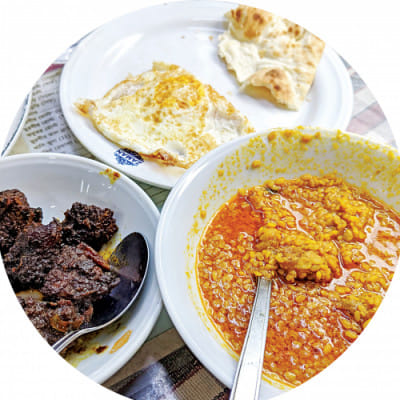There’s No Place Like Home

In the west, once you are 18, you have to move out of your parents' house and find your own place. Many move to a different city for higher studies. In Bangladesh, I went through the same experience.
Even though I come from Chittagong, a port city with reputed universities, I moved to Dhaka to begin a new chapter in my life. A 258 kilometre journey to experience freedom and new frontiers.

Sure, Dhaka is very much a concrete jungle. With little-to-no getaways and terrible traffic, the living expenses were high but it had its upsides. There were high-paying jobs, quality food, coffee shops, big concerts and my true love, kacchi biriyani. Then came along Covid-19 and just like that, I was unemployed.
I moved back with my parents for an unforeseeable future. I had the same feeling when I had moved to Dhaka seven years before. This time, I began getting to know my city in a different light. So different that most people here speak a completely different dialect which the rest of the country barely understands; people here say they are a Chittaingya first, and a Bangladeshi later. This was evident when the government officially changed the name of the city to "Chattogram", however, locals refuse to acknowledge it. Such a sense of pride and belonging has led to different tastes in food, culture, society compared to the rest of the country. Chittagong does not even serve kacchi in weddings as the main dish!
I used to visit Chittagong during semester breaks and holidays. The two cities have such distinct lifestyles that I developed alter-egos for each.
In Dhaka, where my life was fast paced, I was an outgoing person. You'll know what I mean if you've lived it. And so when the city changes, so does the person. Chittagong is a city with a small town vibe. Here, because of a more conservative culture, most cannot stay out past 10 PM. Life is a lot quiet here. The dining out culture is not as popular as Dhaka. Cafés and restaurants are usually half full, unless you are talking about Zaman Hotel. It is always full in Zaman Hotel—all branches, all day long.
Weekdays are ordinary. There are no hour-long traffic jams to work. No one wastes their time on the road. When the sun sets, the young and the old all head home or somewhere to hang out with friends, enjoy a cup of tea and maybe talk about politics. My father used to do all this, I do this and my younger brother has just started. I guess it's common in Dhaka too, but here it feels more passionate, more personal.
Then comes the weekend. Even if you do not own a calendar or your phone doesn't work, you can tell it's Friday if you live in Chittagong. The weekend mornings here have a special sound, a unique smell, and a different taste altogether. There is barely any sound outside; you may hear a few rickshaws or hawkers. That's it. If you wake up early, you can go to your local restaurant and buy soft naan charred in spots, made in a clay oven. Having that naan with moong daal, followed by a hot cup of milk tea with bakarkhani that's as sweet as a mother's love, is a heavenly experience. The fathers visit the fish markets in Fishery Ghat to buy the catch of the day or Chawkbazar to do groceries.
The afternoons are as lazy as they come. Most people usually visit their relatives who live no more than a few kilometres away. So, us Chittaingyas are always "closer". Apart from that people go for a drive around the Naval Academy area, CRB Hill, Bhatiary, Patenga beach or Foy's Lake. Just the perks of living in a smaller city.
One thing that might come as a surprise to anyone is that Chittagonian mothers know more people than anyone else. Take my mother for example. She stays in touch with everyone from our building, with other aunties in the neighbourhood and from the previous places we lived. Hence, your neighbours might know more about you than you think. Imagine the resources and networks Chittagong mothers have in their arsenal if they want to set up a marriage. And all that without using Facebook. Amazing!
Now that I think about it, living in Chittagong is great. You have most of the things one can find in Dhaka, minus the traffic, living expenses, and poor air quality. What you don't get, I believe the serene hills, the beach and the surrounding nature compensates for it. Moreover, you might get invited to a few Mezbaan events. And that, my friends, is a win.
Syed Mohaiminul Islam is a civil engineer waiting for the universe to guide him to his destination. Reach him at [email protected]

 For all latest news, follow The Daily Star's Google News channel.
For all latest news, follow The Daily Star's Google News channel. 



Comments